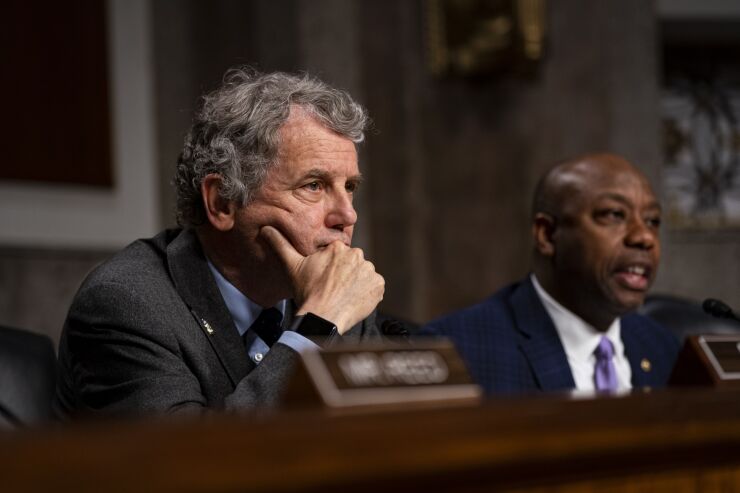
WASHINGTON — Washington teaches you to never waste a crisis. But the trick, it seems, is that the crisis has to be big enough.
Just a few months after three large regional bank failures, momentum on Capitol Hill to
"Once the regional banks felt like they had achieved some stability, I think that sort of took things off the front burner a bit in terms of what needed to be addressed," said Chris Hayes, president of financial services policy advisory firm RedLine Policy Strategies.
The most significant progress has come from the
"I think once the immediate impact was addressed, the shift has been more to thinking about more stringent controls about executive compensation," Hayes said.
That executive compensation package could make it in some form to President Joe Biden's desk, said Todd Phillips, an assistant professor at Georgia State University, although it will have to pass through the Republican-controlled House.
"Things don't pass out of the Senate Banking Committee very often, and it passing out with only two dissenting votes means it's going to be very hard for the House to frankly not act on it," he said. "I think something will happen, but I'm not exactly sure when."
But Congress isn't likely to pass anything more impactful than what's already been marked up in the Senate Banking Committee, Phillips said. On deposit insurance reforms, at least, Senate Banking Committee Chairman Sen. Sherrod Brown, D-Ohio, said in a recent hearing that while he'd like to consider raising deposit insurance ceilings and premiums, that has to be paired with making the banking system safer in some way.
"In his mind, deposit insurance reform has to go hand in hand with something else," Phillips said. "That's just not where the Republican party is right now. We're in the middle of a presidential election, the ranking member is running for president, the House is focusing on crypto. I wouldn't say there's an appetite on the Republican side to put pen to paper and come out with proposals that would in some way restrict the banks."
Reforming the deposit insurance system would almost certainly mean that banks have to pay more into the Deposit Insurance Fund, which most banks would oppose, particularly small ones who already complain that hikes to the deposit insurance rate further squeezes already-tight margins.
"There's a lot of lack of interest in the amount of capital it would take to back up the Deposit Insurance Fund, at least on the Republican side of the aisle," Hayes said. "There is the feeling that would be onerous, and the banks themselves maybe aren't pushing for that."
And political considerations are creating headwinds for those who'd like to see more big-ticket banking reforms from Congress. The financial services industry tends to donate to election campaigns, so that could curb the desire of those in competitive races — or specifically Sen. Tim Scott, R-S.C., ranking member of the banking panel and Republican presidential nominee hopeful — to pick a fight with the banking lobby.
That's especially true since most voters didn't feel the impact of the regional bank failures, due to the quick action from federal regulators to stem further bank runs, he said.
"It did not really impact the real economy, which means that there wasn't a whole lot of demand for action from the general public." Phillips said. "Clearly, advocacy organizations have mobilized, but if lawmakers are not hearing it from constituents, they aren't going to act."






